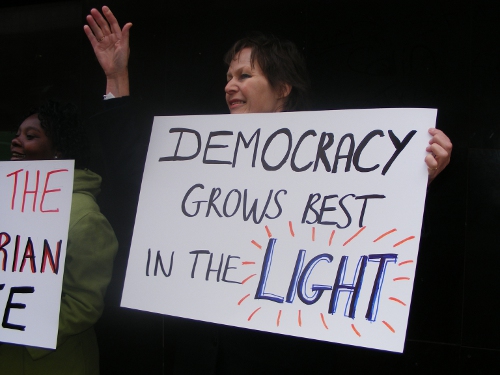On 12 September 2013 President Jacob Zuma announced that the Secrecy Bill as was tabled to him back in April 2013, does not pass constitutional muster, sending it back to Parliament for redrafting.
The R2K Campaign has welcomed this decision and have issued a statement with notes of what still needs to be addressed.
The R2K Statement
 The Right2Know Campaign welcomes President Zuma's acknowledgement that the Secrecy Bill does not pass constitutional muster. We welcome the President's decision not to sign the Secrecy Bill and to return it to Parliament for redrafting.
The Right2Know Campaign welcomes President Zuma's acknowledgement that the Secrecy Bill does not pass constitutional muster. We welcome the President's decision not to sign the Secrecy Bill and to return it to Parliament for redrafting.
We call on members of Parliament to seize this opportunity to redeem themselves and redraft the Bill to bring it inline with the values of openness and transparency upon which we can an ensure an accountable democracy able to deliver the needs of our people.
In his brief statement, President Zuma only mentioned concerns around Section 42 Section 45 of the Secrecy Bill. These are only two of many draconian aspects of Bill that Parliament must resolve to avoid a constitutional challenge (see the list below).
We view the President's action as an important victory, not only for the struggle for social justice, but for a mobilised citizenry. An extraordinarily broad range of voices has made the call for the President to reject the Secrecy Bill. Right2Know salutes the efforts of countless community groups, activist movements, workers' organisations, universities, media organisations, and members of the public.
Parliament must now take up the baton and remove every draconian measure from the poisonous Bill.
-ENDS-
For Comment:
Murray Hunter (072 672 5468), Dale McKinley (072 429 4086), Jayshree Pather (0824135621), Desmond D'Sa (083 982 6939).
Note to Editors:
Outstanding issues that Parliament must now address:
Ensure a full Public Interest Defence.
The current Secrecy Bill only has narrow protection for whistleblowers and public advocates that excludes a range of matters in the public interest like shady tendering practices or improper appointments within key state agencies.
Ensure full whistleblower protection.
Under the current Secrecy Bill a whistleblower, journalist or activist who discloses a classified record with the purpose of revealing corruption or other criminal activity may be prosecuted under the "espionage" and other offences not covered by the proposed Public Interest Defense.
Don't criminalise the public as spies.
In the current Secrecy Bill people can be charged with "espionage", "receiving state information unlawfully" (to benefit a foreign state), and "hostile activity" without proof that the accused intended to benefit a foreign state or hostile group or prejudice the national security; only that the accused knew or "ought reasonably to have known" that this would be a "direct or indirect" result.
Limit the Bill to the security agencies.
The current Secrecy Bill still gives powers of the Minister of State Security to give classification powers to other state bodies (and junior officials) without adequate public consultation.
Include a Public Domain Defense.
The current Secrecy Bill effectively criminalising the population at large. When classified information becomes public it is no longer a secret. Rather than holding those responsible for keeping secrets accountable, the current Bill punishes anyone who accesses information once it has been leaked into the public domain.
Reduce draconian sentences.
The current Secrecy Bill still contains draconian sentences of up to 25 years in jail. These are out of line with international practice and will have a chilling effect on anyone in possession of information in the public interest.
Don't undermine the Promotion of Access to Information Act (PAIA).
The procedure in the current Bill permitting applications for the declassification of classified information is in conflict with the PAIA - despite commitments from Parliament to the contrary.
Introduce an independent review panel.
The body established to review classification (a Classification Review Panel) is not sufficiently independent and the simple possession of classified information appears to be illegal even pending a request for declassification and access.
Let the Apartheid truth be told!
Information that has been made secret in terms of old and potentially unconstitutional laws and policies will remain classified under the current Secrecy Bill pending a review for which no time limit is set. This includes information classified under the apartheid-era Protection of Information Act of 1982 and the government policy adopted in 1996, the Minimum Information Security Standards.





 The Right2Know Campaign welcomes President Zuma's acknowledgement that the Secrecy Bill does not pass constitutional muster. We welcome the President's decision not to sign the Secrecy Bill and to return it to Parliament for redrafting.
The Right2Know Campaign welcomes President Zuma's acknowledgement that the Secrecy Bill does not pass constitutional muster. We welcome the President's decision not to sign the Secrecy Bill and to return it to Parliament for redrafting.